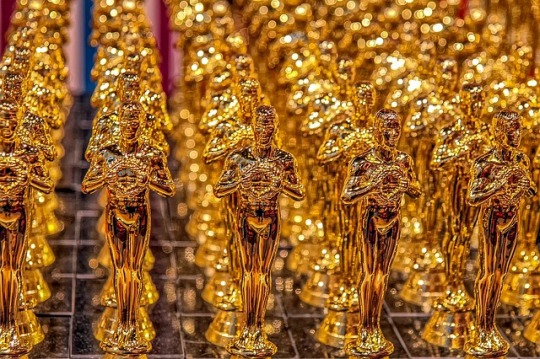For the first time, public libraries are barred from offering at least five Oscar-nominated films
Films from Netflix, Hulu, and Amazon Studios are nominated for Best Picture, Best Original Screenplay, as well as Lead Actress and Actor—but several will not be available to those who can’t get fast internet or afford a subscription.
Press contact: press@fightforthefuture.org
For immediate release Tuesday April 13, 2021

Image by analogicus from Pixabay features rows of gleaming gold Oscars trophies.
2020 is the first year that streaming-only works are eligible for Academy Awards, due to a pandemic exception. In their availability assessment, Fight for the Future and Library Futures considered titles nominated for Best Picture, Best Original Screenplay, as well as Lead Actress and Actor—prominent awards whose trends forecast the future of the film industry. This lack of public library availability among these major categories sets a dangerous precedent in the age of streaming giants—not only that they are growing as major arbiters of culture, but now as arbiters of access as well.
In a new blog post, Library Futures and Fight for the Future are calling on Netflix, Hulu and Amazon Studios to make their content available to public libraries on the same terms as theatrical releases. The streaming giants are setting a dangerous new precedent for the most important films of the year—that important cultural works and knowledge are only for people with disposable income.
Among the works nominated for the most prominent award categories, Netflix’s Ma Rainey’s Black Bottom, Pieces of a Woman, and The Trial of the Chicago Seven; Amazon Studios’ Sound of Metal, and Hulu’s The United States vs. Billie Holiday are unavailable for public libraries to purchase, preorder, or even license for their collections.
Since VHS tapes democratized access to films, many library users have enjoyed the opportunity to view important cultural works by borrowing them. But in the digital age, Big Tech is prioritizing profit and data surveillance over libraries and the diverse, often low-income people who rely on them.
“When so many rural, urban, and low-income people lack affordable high speed internet access or disposable income, tech giants are exacerbating inequality by locking important knowledge and art behind a paywall,” said Lia Holland (she/they) Campaigns and Communications Director at Fight for the Future. “This inequity is particularly staggering when you consider the content of the unavailable films themselves—the themes of protest, persecution, racial equity, and gender equity that are essential to our times. Do they truly believe that the most compelling stories to inspire change should be only for people in upper class communities?”
“During the last major financial crisis in 2008, users flocked to the library to gain access to an enormous collection of content, including recent films. These collections supported patrons from every income level and background, and circulation shot up all over the country,” said Jennie Rose Halperin (she/her) Executive Director at Library Futures. “Now, paying for access to all of the Academy Award nominated films on three separate streaming platforms would cost almost $400 per year – and that’s assuming you can afford internet access at all. As streaming has moved from distribution to content production, streaming services have moved to prohibit libraries and under resourced communities from purchasing films in a digital or physical format.”

